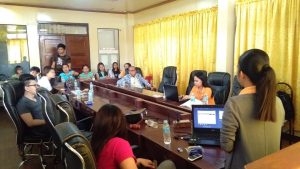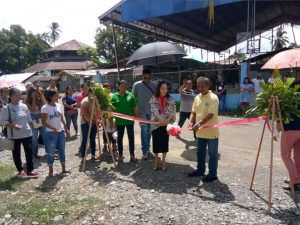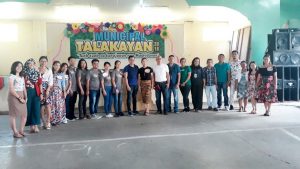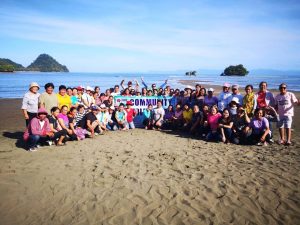In the Philippine setting, one of the identified contributors to poverty is the lack of opportunities, especially in availing basic services that are critical to the upliftment of one’s status in life.
When the Kapit-Bisig Laban sa Kahirapan – Comprehensive and Integrated Delivery of Social Services National Community-Driven Development Program (KC-NCDDP) was implemented in Caraga Region in 2016, the previous administration of the municipality of Madrid in Surigao del Sur province waived the first cycle. Many members of the Municipal Government regretted not taking the opportunity as they saw the said program as potential response in alleviating poverty and improving the living condition of the townspeople.
After a year, the Department of Social Welfare and Development (DSWD) pushed again its program to Madrid town. This time, without second thoughts, the current administration led by Mayor Mary Grace Kimura took the opportunity and pledged their full support to the program.
Although Madrid was not able to start the implementation of KC-NCDDP together with other local government units (LGUs) in Caraga, they still excelled in carrying out the next three cycles of the program.
The municipality of Madrid made sure to make the most of the second chance given to them.
Meeting objectives, attaining goals
The first cycle formally began on May 19, 2017, with an orientation on the dynamics and process of the Kalahi-CIDSS Program to the municipal and barangay officials.
Since the implementation, the Municipal Government worked hard to obtain the program’s objectives and devoutly made sure that all the paper works, requests, and deliverables were acted on promptly.
The second and third cycle were launched on April 26, 2018 and August 23, 2019, respectively. All throughout the three cycles, the municipality of Madrid participated in the planning, implementation, and mobilization of the communities.
Even Municipal Vice Mayor Philip Urquia personally engaged in the program implementation as he was able to witness KC-NCDDP’s positive impact to the communities.
“The program is unique because it operates on the principles of transparency, accountability, and community participation. I learned that everyone in our community should be involved in the process. The solutions should come from them because they know firsthand the issues and needs of their community,” he said.
In terms of sub-project (SP) implementation, all of the SPs were completed within the timeframe and passed the quality standard. Madrid implemented and accomplished a total of 15 SPs — four SPs in the first cycle, six SPs in second cycle, and five SPs in third cycle.
To guarantee that these projects were duly implemented, the municipality designated the Municipal Inter-Agency Committee (MIAC) to attend to the needs of the completion of these projects. The Municipal Engineering Office was also tasked to extend assistance to the Deputy Area Coordinators of the Kalahi-CIDSS Program in checking and monitoring the construction of these infrastructure projects.
However, unforeseen circumstances arose along the way and almost delayed the target date of completion. But this did not prevent the municipality to continue working relentlessly. To comply with the deadline, they conducted meetings right away with the Area and Municipal Coordinating Team (A/MCT) and community volunteers to fix the situation.
Moreover, even if the implementation of the three cycles has overlapped with each other, fund utilization was still managed conscientiously. Some 95% of the disbursement vouchers were declared to be in good standing during fiduciary sessions. The Regional Program Management Office (RPMO) detected minimal findings and observations but these were complied quickly by the municipality.
No doubt, the success of the three cycles has been made possible because of the hard work, perseverance, and profound dedication of the municipal government of Madrid, particularly the MIAC to help and uplift every Madridanons.
Most members of the MIAC exhibited active and genuine involvement to the program by attending meetings and trainings conducted by the Kalahi-CIDSS; providing technical assistance to the community volunteers and the A/MCT staff; participating during fiduciary workshops; reviewing project proposals and disbursement vouchers; and taking part in site and project validations.
Other than these contributions, Madrid also provided their local cash counterpart in the implementation of all sub-projects.
The Municipal Government assured that no Madridanon is left behind. As Mayor Kimura would say, “I have been aspiring for this kind of program. This is not just for us in higher positions but this is for every Madridanon.”

Replicating the ‘Kalahi Way’
The local government unit of Madrid showed much appreciation of the process used by the Kalahi-CIDSS Program. They observed that the Community-Driven Development (CDD), the strategy utilized by the program, is a more effective way of addressing the needs of the community. Not only does it address the concerns of the people, the program also capacitates and empowers them by allowing them to get involved in the process and to play vital roles.
Hence, this resulted to their replication of the Kalahi-CIDSS process in implementing two sub-projects that they fully funded. In this way, inclusive participation, transparency, and accountability are emphasized and fully-maximized by the communities in the grassroots.
Indeed, nothing beats the ‘Kalahi Way’.

Initiating interventions
Madrid town made quite a number of measures and innovations to expedite the process and guarantee the success of the Kalahi-CIDSS program implementation.
First, the municipal government religiously posted all activities organized by the program such as assemblies and procurement meetings on every announcement boards. In this manner, the people are well-informed of the activities and transparency is given much value.
Second, Madrid has also given attention to the members of the Indigenous Peoples (IP) community residing in the municipality. When the cash grant during the MIBF-PRA fell short, they allotted a budget for the said community. During the second cycle, they allocated funds for the IP community in Barangay Bayogo and funded the proposed sub-project of the Bayogo Tribal Community.
Third, the local government also supported and funded the Community Volunteers’ Day in the municipality. The event was held to recognize and reward the community volunteers for their hardwork, sacrifice, and effort.
Lastly, the municipal government sponsors and organizes a teambuilding activity for the A/MCT during every cycle of the program.

Capacitating the people
With the LGU’s active involvement and hardwork in implementing Kalahi-CIDSS, the community volunteers have also developed understanding and appreciation towards the program. Many individuals have been motivated to step out of their comfort zones, discover their skills and capacities, maximize potentials, and contribute to nation-building.
At present, the municipality of Madrid has a total of 419 community volunteers composed of 303 women volunteers and 116 men volunteers.
On top of that, some community volunteers have been elected as officials in their barangays. Through their learning and experiences in the Kalahi-CIDSS Program, they realized that they have what it takes to be a leader and have something big to offer for the improvement and growth of their respective communities.

Pursuing community-driven development
Because of the enthusiasm and response of the municipal government, Madrid is one of the seven municipalities in the country included in the 2020 Program Extension of the Kalahi-CIDSS.
Other municipalities included in the program implementation next year are the towns of Barobo and San Agustin in Surigao del Sur province; Basilisa and San Jose in Dinagat Islands province; and Taganaan and Placer in Surigao del Norte.
Mayor Kimura said that this challenge won’t come easy, but is optimistic that the municipality will be able to make ends meet and perform beyond what is expected of them.
Further, Municipal Planning Development Coordinator Myrna Sullano also sees the extension as an excellent opportunity in enabling and training the people in the communities. She said that the CDD approach has a different and unique way of connecting the local government and the people. It also enables the people even in the grassroots level.
As they continue to implement the program next year, the municipality fervently hopes that they can deliver basic social services to their communities and help more Madridanons.
Madrid town may have been a year late in the implementation of the Kalahi-CIDSS Program but it cannot be denied that it is a municipality ascending.

